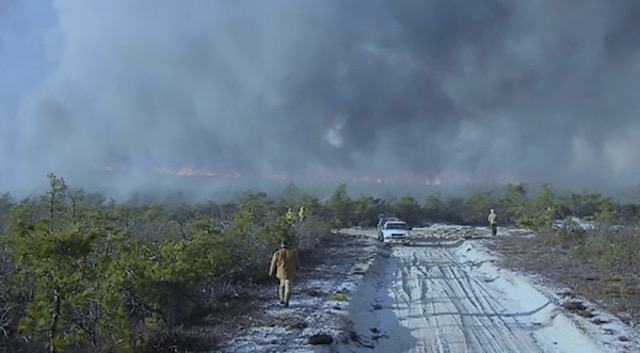The Most Absurd Pretext For Logging You Ever Heard Of
Smoke Gets In Their Eyes
I thought I’d repost this December 2019 post, given all the public and media focus on climate driven wildfires and logging (forestry management).
It also is of direct relevance to the currently ongoing deliberations of Senator Smith’s Forestry Task Force, who appear poised to recommend expansion of current “prescribed burn” and “forest thinning” practices to reduce (exaggerated) wildfire risks.
Am I the only one shocked by this crap? I got zero feedback on it and it seemed to fall into a black hole.
NJ DEP & NJ Conservation Foundation Partner With Military To Burn NJ Forests – No Consideration of Climate Impacts
December 15th, 2019
Tentacles of Military Industrial Complex Extend Into Conservation Groups
Beware the REPI Man!
(This is US Military’s caption: Controlled burns help prevent wild res, which reduce visibility for air exercises. Photo credit: Dr. Walter Bien, Laboratory of Pinelands Research)
File this one under “K” for “Know Your Partners”. Curious, maybe I missed it, but I don’t recall ever reading about any of this in an NJ DEP or NJCF press release.
According to the US Department of Defense, in order to “protect the military’s mission“, the US military spent over $16 million in NJ, including the preservation of over 9,000 acres of land via the “REPI” program:
The Readiness and Environmental Protection Integration (REPI) Program is a key tool used by DoD and its partners to protect the military’s ability to train, test, and operate in the state. DoD created the REPI Program in response to the development of lands and loss of habitat in the vicinity of or affecting its installations, ranges, and airspace that can lead to restrictions or costly and inadequate training and testing alternatives. Through REPI, DoD works with state and local governments, conservation organizations, and willing private landowners to address these challenges to the military mission and the viability of DoD installations and ranges. … Through FY 2018, DoD and its partners have spent over $44 million on REPI projects at 3 installations in New Jersey.
The military funding includes support for “conservation organizations”, as well as the Pinelands Commission.
REPI is a national program, operating in virtually every state. See the individual state REPI fact sheets.
The REPI program includes not only land conservation, but damaging practices like “controlled burns”, which were justified because they allegedly “help prevent wildfires, which reduce visibility for air exercises.”
But what military photo captions don’t tell you is that military training operations themselves cause fires, specifically “one fire every 14 days”.
Here is a project that NJCF partners on that admits creating fires:
One of the most heavily utilized Air National Guard training ranges in the U.S., Warren Grove Range is a key Northeast training asset for all four Services, with its remote location providing unique operational capabilities. However, its location in the New Jersey Pinelands is also one of the most flammable areas in the country. Every year training activities ignite one fire every 10-14 days, which are suppressed on-site.
When wildfires occur, the range must be totally shut down until theres are suppressed. To reduce the wildfire danger, controlled burns are necessary to manage forest undergrowth. Without buffer lands to properly address undergrowth and fire concerns, the military mission at the range is endangered. In May 2007, the range shut down entirely for more than a year.
It’s is very clear that the justification for these “controlled burns” has nothing to do with ecological science or forestry and everything to do with protecting the military mission. Period.
Imagine all that – and coming from the folks’ whose “air exercises” dropped bombs on an elementary school, see:
And, while we’re on the topic of “visibility”, let’s not forget this one:
The proposal is deficient in addressing [climate and] prescribed burn impacts.
Accordingly the DEP should impose a moratorium on prescribed burns until [climate and prescribed burn] impacts are assessed and regulatory control strategies in place.
The REPI program also conserves lands and prevents development, but again, the justification is grounded in the military mission, not science, land use, or conservation objectives.
Here’s another project at Joint Base McGuire-Dix-Lakehurst:
To ensure compatible land uses around the base, plans call for protecting a two-mile buffer that will preserve remaining open space and agricultural lands. Burlington and Ocean Counties and the state of New Jersey are helping to conserve lands that would threaten the military mission if developed, particularly within and around the Accident Potential Zones of the base’s runways.
Here are the program’s alleged “military benefits”:
- Preserves off-installation night ying capability through the buffering of high-noise areas
- Improves operational safety
- Provides for multi-Service missions and future mission growth
Of course, there is no consideration of the military’s emission of greenhouse gases during their “mission” or from conducting these “training operations”, or the GHG emissions associated with “controlled burns” and routine fires these “training operations” create, or the impact on carbon sequestration in soils and vegetation.
And oops! Looks like I buried the lede: Did I mention that the US military is one of the largest emitters of greenhouse gases?
Research by social scientists from Durham University and Lancaster University shows the US military is one of the largest climate polluters in history, consuming more liquid fuels and emitting more CO2e (carbon-dioxide equivalent) than most countries.
The majority of greenhouse gas (GHG) accounting routinely focuses on civilian energy use and fuel consumption, not on the US military. This new study, published in Transactions of the Institute of British Geographers, calculates part of the US military’s impact on climate change through critical analysis of its global logistical supply chains.
So, the next time you hear about the need for a controlled burn, especially in the Pinelands, look for the REPI man behind the curtain dangling military money.
And let’s hope the REPI man stays out of Highlands Forests.
